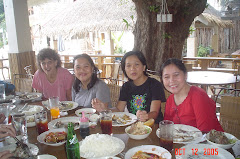Our unit is tasked to accredit students' organizations by giving them a three-hour gender sensitivity. We opened the session by a game called "group yourselves according to". So, I let them group themselves based on their age, colleges, religion, regional location and type of family (with two parents or single parent). It was a revelation that most of the students, at that time, come from Luzon area (only two from Mindanao). All of them are Roman Catholics. Only one from the College of Law, some are from Education, Home Economics, Tourism, etc. I asked them what are the "images" (stereotypes) of their college. It was familiar to hear that HE has the 'motherly' image. But with a male student enrolled in HE, I should have asked how he felt. I delved more on the three students with single moms. One of them said, "matiisin ang kababaihan" or women are persevering so they can perform very well as effective moms. From there, I discussed how women have been marginalized citing statistics on violence, work, empowerment.
One question from a fraternity man united the males in the group. He said, "akala ko gender equality ang topic, bakit ang babae lang ang pinakikitang agrabiyado" (I thought this is about gender equality, why is that only women were portrayed as disadvantaged). So, I encouraged him to mention a men's concern which made them at a disadvantaged position. He said women employing domestic househelp (OFWs) only shows women are 'oppressing' other women; not that men oppresses women (to that effect). So I told them that women's disadvantaged position evolved historically. During the olden days, when women live in a communal structure, every child is taken cared of by the whole community, not by individual women. When industrialization sets in, men were displaced from their families and become workers. So, women stayed at home and did housework. Now that women are in demand abroad as DHs, so the men take on the job as 'househusbands'. And I commend these men who chose or perform such role/s. This is the same solution that most wives advocate: for their husbands to share in the housework.
I don't know if I had convinced them of the necessity of advocating for gender equality, but the fact that they freely shared their feelings about their mothers and their views about gender inequality and lastly asking my name, perhaps that would tell a lot about the effectiveness of making them feel what it means to be women in this society...
Thursday, June 25, 2009
Subscribe to:
Post Comments (Atom)





No comments:
Post a Comment